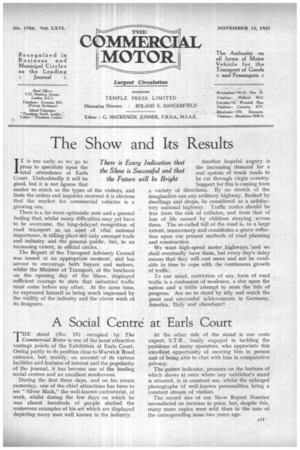The Show and Its Results
Page 1

If you've noticed an error in this article please click here to report it so we can fix it.
II is too early as we go to press to speculate upon the total attendance at Earls Court. Undoubtedly it will be good, but it is not figures that matter so much as the types of the visitors, and from the orders and inquiries received it is obvious that the market for commercial vehicles is a growing one.
There is a far more optimistic note and a general feeling that, whilst many difficulties may yet have to be overcome, the long-delayed recognition of road transport as an asset of vital national importance, is faking place not only amongst trade and industry and the general public, but, to an increasing extent, in official circles.
The Report of the Transport Advisory Council was issued at an -appropriate moment, and has served to encourage both buyers and makers, whilst the Minister of Transport, at the luncheon on the opening day of the Show, displayed sufficient courage to state that industrial traffic must come before any other. At the same time, he expressed himself as being much impressed by the virility of the industry and the clever work of its designers. There is Every Indication that Another hopeful augury is • the increasing demand for a the Show is Successful and that real system of trunk roads to the Future will he Bright be cut through virgin country. Support for this is coming from a variety of directions. By no stretch of the imagination can any ordinary highway, flanked by dwellings and shops, -be considered as a satisfactory national highway. Traffic routes should be free from the risk of collision, and from that of loss of life caused by children straying across them. The so-called toll of the road is, to a large extent, unnecessary and constitutes a grave reflection upon our present methods of road planning and construction. • We want high-speed motor highways, "and we shall eventually have them, but every day's delay means that they will cost more and not be available in time to cope with be continuous growth of traffic.
To our mind, restriction of any form of road traffic is a confession of weakness, a slur upon the nation and afutile attempt to stem the tide of progress. Are we to stand by idly and watch the great and successful achievements in Germany, America, Italy and elsewhere?








































